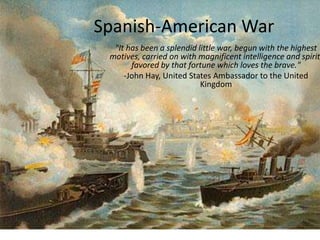
Spanish-American War: US Victory Over Spain
- 1. Spanish-American War "It has been a splendid little war, begun with the highest motives, carried on with magnificent intelligence and spirit favored by that fortune which loves the brave." -John Hay, United States Ambassador to the United Kingdom
- 2. Spain and Cuba • 1895: Cuban revolt against the rule of Spain Columbia (the American people) reaches out to help oppressed Cuba in 1897 while Uncle Sam (the US Government) is blind.
- 3. U.S. Sympathizes with Cubans • William Hearst’s New York Journal and Joseph Pulitzer’s New York World publish atrocity stories (some true, some created) • Men like Hearst and Pulitzer created what would be known as Yellow Journalism- is a type of journalism that presents little or no legitimate well-researched news and instead used eye- catching headlines to sell more newspapers.
- 4. U.S. War Fever was Incited • USS Maine visited Cuba and mysteriously exploded in Havana Harbor February 15, 1898 • A Spanish letter critical of President McKinley angered Americans • President McKinley asked Congress for a declaration of war
- 5. Congress’s Declaration of War • Issues a four part statement on April 19, 1898 - They declared Cuba free - They stated that Spain must withdraw - They stated that armed forces would be used to achieve the above two items - They declared that the U.S. had no intention of annexing Cuba (Teller Amendment)
- 6. Time Line and Events of the War • May 2, 1898: Commodore George Dewey defeated the Spanish in the Philippines • August 13, 1898: American troops capture Manila in the Philippines • July 3, 1898: Spanish fleet destroyed in Cuba • August 12, 1898: armistice
- 7. Events to Consider during the War • The U.S. preparation for war with Cuba was poorly coordinated. Troops were poorly trained and conditions in the camps were very poor • The most famous of the troops were known as the Rough Riders. They were organized by Teddy Roosevelt and commanded by Col. Leonard Wood. • 5000 Americans died in the war, but only 500 died in battle. The remainder died of disease.
- 8. Treaty of Paris • U.S. received Guam and Puerto Rico from Spain • Cuba was freed • U.S. paid Spain 20 million for the Philippines John Hay, Secretary of State, signing the memorandum of ratification on behalf of the United States
- 9. Opposition to American Imperialism • Anti-imperialists argued against acquisition of the Philippines: -it violated the American ideal of “consent of the governed” as found in the Declaration of Independence -despotism abroad might lead to despotism at home -annexation would propel the U.S. into the political and military cauldron of the Far East
- 10. McKinley’s Decision • The President decides to keep control of the Philippines • This decision was followed by a rebellion in the Philippines led by Emilio Aguinaldo • The rebellion lasted 3 years, cost more than 170 million dollars, and resulted in the lives of 4000 Americans and 20000 Filipinos • With the Philippines as a base, the U.S. now sought an Open Door Policy in China Emilio Aguinaldo in the field. Filipino soldiers outside Manila in 1899.
- 11. McKinley’s Decision continued… • Cuba was freed, but the U.S. imposed the Platt Amendment which gave the U.S. the right to intervene in Cuba and to guarantee a U.S. base in southeast Cuba (Guantanamo Bay)
- 12. McKinley’s Considerations • He considered commercial interests: a base for trade in Asia; the need to keep other countries from seizing it • He considered what was the “White Man’s Burden”: to develop, educate, and uplift less fortunate peoples • He considered the need for refueling bases for the growing U.S. Navy (Alfred Thayer Mahan’s book, “The Influence of Sea Power Upon History, 1660-1783”) The white man's burden – The Journal, Detroit, 1898.